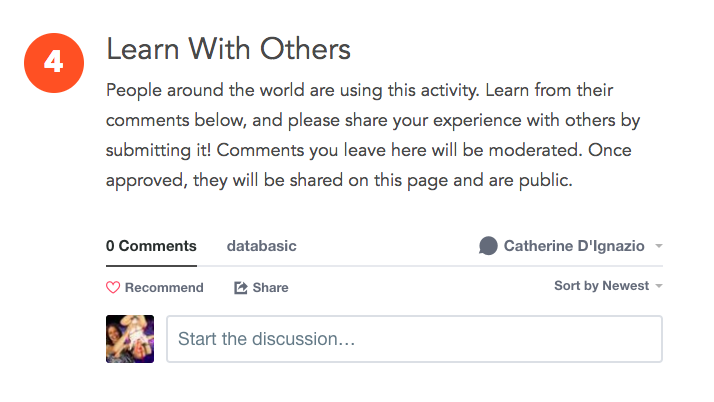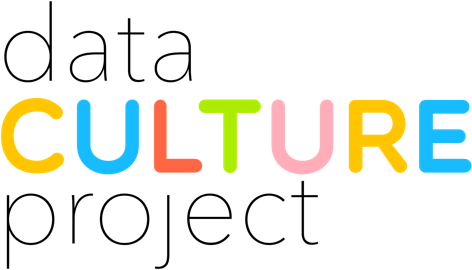Learning to work with data is like learning a new language — immersing yourself in the culture is the best way to do it. For some individuals, this means jumping into tools like Excel, Tableau, programming, or R Studio. But what does this mean for a group of people that work together? We often talk about data literacy as if it’s an individual capacity, but what about data literacy for a community? How does an organization learn how to work with data?
About a year ago we (Rahul Bhargava and Catherine D’Ignazio) found that more and more users of our DataBasic.iosuite of tools and activities were asking this question — online and in workshops. In response, with support from the Stanford Center on Philanthropy and Civil Society, we’ve worked together with 25 organizations to create the Data Culture Project. We’re happy to launch it publicly today! Visit http://datacultureproject.org to learn more.
The Data Culture Project is a hands-on learning program to kickstart a data culture within your organization. We provide facilitation videos to help you run creative introductions to get people across your organization talking to each other — from IT to marketing to programs to evaluation. These are not boring spreadsheet trainings! Try running our fun activities — one per month works as a brown bag lunch to focus people on a common learning goal. For example, “Sketching a Story” brings people together around basic concepts of quantitative text analysis and visual storytelling. “Asking Good Questions” introduces principles of exploratory data analysis in a fun environment. What’s more, you can use the sample data that we provide, or you can integrate your organization’s data as the topic of conversation and learning.
Developing Together
We built DataBasic.io to help individuals build their data literacy in more creative ways. We’ve baked in design principles that focused on learners (read our paper), argued to tool designers that their web-based tools are in fact informal learning spaces (watch our talk video), documented how our activities are particularly well suited to data literacy learners (read another paper), and focused them on building a data mindset (read our opinion piece).
These activities and tools were designed and iterated on with interested users (with support from the Knight Foundation). We develop all our tools based on the problem organizations bring to us. Our latest grant was a partnership with Tech Networks of Boston, who brought years of experience working with organizations to develop their capacity and skills in a variety of ways. We prototyped a first set of videos, for the WordCounter “Sketch a Story” activity with them, and tried it out in a local workshop with some of their partners and clients.
Trying Out a Model — the Data Culture Pilot
Based on how that went, we recruited 25 organizations from around the world to help us build the Data Culture Project. Non-profits, newsrooms, libraries, community groups were included in this cohort, and we created a network to help us guide our prototyping. Over the last 6 months, each group ran 3 activities within their organizations as brown-bag lunches.
It was wonderful to have collaborators that were willing to try out some half-baked things! After each workshop, they shared how it went on a group mailing list. Then each month we hosted an online chat to get feedback and share insights and common points from the feedback.
Even in these prototype sessions, the participants shared some wonderful insights. Here are just a few:
- “It did lead to a pretty significant rethink fo the communications director for what is coming out in the spring.”
- “I hear back from participants regularly about how much they enjoyed the activities and wondering what comes next.”
- “As they were working through their data sets, they kept coming up with more questions it made them wonder about and more things to consider about those questions.”
- “They can relate everything back to their own situations / data / organizations.”
We were heartened and excited to see that our design partners were able to see impacts already!
How to Join the Community
We are launching the Data Culture Project today. Here’s how to make the best use of the project and the community:
- Read about why you don’t need a data scientist; you need a data culture to understand why data literacy needs to be understood as a community capacity, in addition to an individual capacity.
- Run one or more of the activities listed on the Data Culture Project home page. We found in the pilot that running one per month (and providing pizza) can work to bring people together.
- Remix and modify the activity to work for you and tell us about it! At the bottom of each activity page, you’ll see a “Learn With Others” comment box where you can tell others what worked for you (á la Internet food recipe sites).
- Join our mailing list to connect with others working on creative approaches to building capacity in their organizations (and be the first to hear about new activities and projects).

Remix and modify the activity to work for you and tell us about it! At the bottom of each activity page in the Data Culture Project, you’ll see a “Learn With Others” comment box where you can tell others what worked for you (á la Internet food recipe sites).
We are grateful to the Stanford Center on Philanthropy and Civil Society for supporting the development of the Data Culture Project. The Data Culture Project is headed by Rahul Bhargava and Catherine D’Ignazio, undertaken as a collaboration between the MIT Center for Civic Media and the Engagement Lab@Emerson College, and with the assistance of Becky Michelson (project manager) and Jon Elbaz (research assistant).


